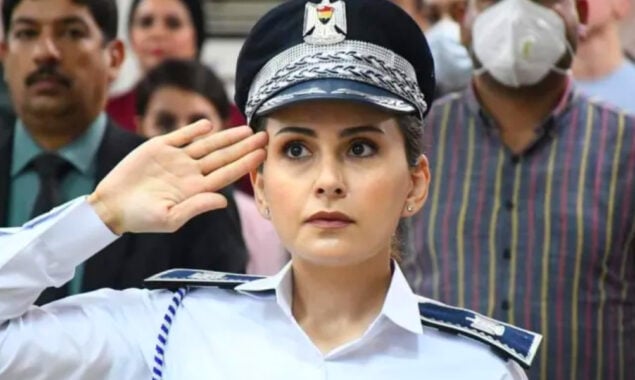Conde’s party withdraws from Guinea peace negotiations
In protest of Alpha Conde's and others' arrest, the party of Guinea's...

Saja al-Abayji was apprehensive about the rigorous military-like exercises and concerned about society’s opinion of women in the police force as she began her training at the police academy.
She was one of just two female officers in her 2011 graduating class, which included hundreds of male officers, all aspiring to serve in Iraq’s Ministry of Interior (MOI), which would be responsible for the country’s police and border control.
But a decade later, the 34-year-old Iraqi traffic cop is now a senior traffic officer in Baghdad, where he has worked for years at the General Traffic Directorate. Al-Abayji is one of hundreds of female officers in Iraq’s police and border control who are not part of a limited group of women in the country’s internal security services.
According to al-Abayji, as the number of female police officers on Iraq’s streets increased, society gradually began to accept women’s position in law enforcement.
Some felt women couldn’t thrive in the police force because they thought it wasn’t their place to be there. ” Al-Abayji said that many people saw female police as “intruders” on the field because of this.
Societies started to perceive things differently as time went on, though.
The Iraqi MOI’s agencies – the police, highway patrol, traffic department, and border enforcement, to mention a few – had no female officers until roughly a decade ago, despite the fact that Iraqi women have been worldwide pioneers in many fields of life, including medicine, engineering, and the arts.
A difficult path
As Al-Abayji pointed out, several of her female classmates left the Higher Institute for Security and Administrative Development during their time in training at the police academy due to their families’ lack of support for a career in law enforcement.
When it came to women’s roles at the time, “this represented where society was,” said al-Abaiji, who was fortunate enough to have the utmost support from her family and fiancé.
“My family and now spouse pushed me to apply to the institution after I earned my degree in computer science,” said al-Abayji. Without them, I would not have been able to deal with all the negativity in my environment.
There were several hurdles on the path to become a police officer for al-Abayji.
“At first, I didn’t tell anybody I’d recently met about what I was doing. In addition to not wearing my police uniform to and from work, I did it because I wanted to remain anonymous, she said. “I didn’t want to be judged, that’s all.
What made me wonder was why society was so appreciative of males who did the same work as me.” Al Jazeera quoted her as saying, “I realised I had to open myself out in order to influence people’s perceptions.
Al-second Abayji’s major issue was adapting to her new job and responsibilities.
First, al-Abayji said, she struggled with the thought of putting on a male outfit and holding a weapon.
According to al-Abayji, “I wore a lot of gorgeous skirts and heels while I was in college.” Later, I found myself participating in military training and honing my target shooting skills. As a result, I was in a state of shock.”
Despite the difficulties, al-“keenness Abayji’s to succeed flowered” as her physical capability and confidence improved, and she became enthusiastic about rising up the ranks.
Progress
Major-General Saad Maan, the interior ministry’s spokesperson, said from his office in downtown Baghdad that the ministry began encouraging women to join the internal security forces in 2010 in order to highlight the significance of growing women’s public role in Iraq.
“Women’s participation has been useful and vital and represents the ministry’s growth and success,” he said.
Female police officers continue to be held back by the patriarchal culture of society, which also prevails in the Ministry, Maan remarked.
“Men in the police force struggle because the patriarchy instilled in them,” stated Maan, to address female officers using their assigned titles.
However, Maan claims that there has been a lot of growth overall. “At first, we pleaded with women to join the force. Every year, we get tens of thousands of applications.”
Looking forward
In the past, women in the police force were restricted to administrative positions, but this is no longer the case, according to Esraa al-Saadi, 32, a media and public relations officer for the interior ministry.
In the past, “guys were the ones who did everything,” said al-Saadi, referring to male officials who made arrests, interrogated suspects, and conducted investigations and searches.
“Iraqi culture is growing more open and tolerant of the police as a place for women, too,” said Al-Saadi, who has worked as a police officer for the last five years.
Al-Abayji acknowledged that society has gone a long way, but she opined that women in law enforcement still have a long way to go before they can hold positions of leadership.
“We have junior and senior female police officers, but no women majors, lieutenants or brigadier generals,” al-Abayji added. As a female Iraqi police officer, I want to one day see my female colleagues rise to the top ranks of the force. We’re getting closer, but there’s still a lot of work to be done.
Nonetheless, al-Abayji continued: “Now, I stroll the streets of Baghdad in my uniform and people applaud and take pleasure in what I do.”
Catch all the International News, Breaking News Event and Latest News Updates on The BOL News
Download The BOL News App to get the Daily News Update & Follow us on Google News.